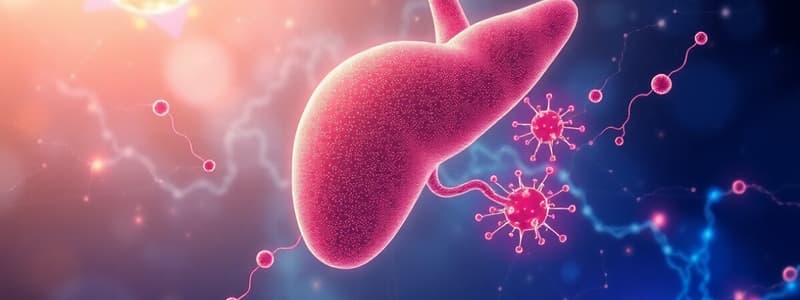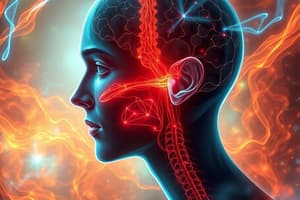Podcast
Questions and Answers
What is the primary role of insulin in the body?
What is the primary role of insulin in the body?
Which of the following types of diabetes is characterized by absolute deficiency of insulin?
Which of the following types of diabetes is characterized by absolute deficiency of insulin?
What is the most likely blood glucose level that indicates a fasting serum glucose (FBS) condition?
What is the most likely blood glucose level that indicates a fasting serum glucose (FBS) condition?
Which of the following factors can lead to elevated fasting serum glucose levels?
Which of the following factors can lead to elevated fasting serum glucose levels?
Signup and view all the answers
What is the conversion formula for A1c from percentage to mmol/mol?
What is the conversion formula for A1c from percentage to mmol/mol?
Signup and view all the answers
Which statement accurately describes the pancreas?
Which statement accurately describes the pancreas?
Signup and view all the answers
Which condition is associated with glucocorticosteroids leading to elevated blood sugar levels?
Which condition is associated with glucocorticosteroids leading to elevated blood sugar levels?
Signup and view all the answers
What does Gestational Diabetes Mellitus refer to?
What does Gestational Diabetes Mellitus refer to?
Signup and view all the answers
Signup and view all the answers
Study Notes
Lab Interpretation: Endocrine Disorders
- Endocrine disorders involve abnormalities in hormone production or function
- The endocrine system includes the hypothalamus, pituitary, thyroid, parathyroid, adrenal, pancreas, ovaries, and testes
The Endocrine System
- The hypothalamus and pituitary gland regulate hormone production in other glands
- The thyroid gland produces thyroxine (T4) and triiodothyronine (T3)
- The parathyroid glands control calcium levels
- The adrenal glands produce cortisol
- The pancreas produces insulin and glucagon
- The ovaries and testes produce sex hormones
Endocrine-Related Disorders
-
Pancreas disorders:
- Diabetes mellitus is characterized by high blood sugar due to defects in carbohydrate, fat, and protein metabolism
- Usually caused by insulin secretion, and/or insulin sensitivity defects
- Types of diabetes include type 1 (absolute insulin deficiency), type 2 (insulin deficiency with/without resistance), and gestational (glucose intolerance during pregnancy)
- Diabetes mellitus is characterized by high blood sugar due to defects in carbohydrate, fat, and protein metabolism
-
Thyroid disorders:
- Hyperthyroidism (excess thyroid hormone) and hypothyroidism (reduced thyroid hormone)
-
Adrenal disorders:
- Adrenal insufficiency (reduced cortisol) and Cushing's syndrome/disease (excess cortisol)
Diabetes Mellitus
- Pancreas is located deep in the abdomen between the stomach and spine
- It has two functions: exocrine (releases enzymes for food digestion to duodenum) and endocrine (releases insulin and glucagon to blood stream)
- Characterized by hyperglycemia (high blood sugar)
- Abnormal metabolism of carbohydrates, fats, and proteins leads to abnormal insulin secretions and/or insulin sensitivity
- Different types: Type 1 (absolute insulin deficiency), Type 2 (insulin deficiency and/or resistance), and gestational (glucose intolerance during pregnancy)
Function of Insulin
- Insulin helps cells (liver, muscle, fats) take in glucose for energy and store glucose
Lab Investigation: Diabetes Mellitus
- Diagnosis involves symptomatic (symptoms present) and asymptomatic (no symptoms) individuals
- Tests include fasting venous plasma glucose (VPG), random VPG, oral glucose tolerance test (OGTT), and A1c
Diagnostic Tests
-
Values for diagnosis of type 2 diabetes mellitus (T2DM)
- Fasting: ≥7.0 mmol/L
- Random: ≥11.1 mmol/L
- Diagnostic values based on HbA1c, and OGTT
- Diagnostic values based on 0 hr and 2 hr readings (OGTT)
- Normal: 0-hr < 6.1, 2-hr < 7.8
- Impaired glucose tolerance (IGT): 0-hr 6.1-6.9, 2-hr 7.8-11.0
- Diabetes mellitus (DM): 0-hr ≥7.0 , 2-hr ≥11.1mmol/L
Glucose Monitoring
- Fasting serum glucose (FBS): Obtained after 10-14 hours of fasting, measures pre-prandial blood sugar
- Random serum glucose (RBS): Obtained at any time, measures blood sugar, also known as 2hr postprandial blood sugar
- Both tests have normal values <7.0 mmol/L and <11.1 mmol/L respectively
- Glycoslated hemoglobin (HbA1c) measures average blood sugar over 2-3 months, used to monitor treatment and reduce microvascular complications (normal: <6.3%)
Thyroid Disorders
-
The thyroid gland produces hormones that regulate metabolism, growth, and development.
-
Thyroid glands:
- A butterfly shaped gland below the Adam's apple
-
Thyroid hormone function:
- Regulates skeletal and growth, bone mineralization, visual and auditory systems, small intestine functions, liver function, heart function, central nervous system, immune system, and basal metabolic rate
-
Thyroid hormone regulation: Through a negative feedback loop involving hypothalamus and pituitary
-
Types of Thyroid Disorders:
- Hyperthyroidism (excess thyroid hormone): Grave's Disease
- Hypothyroidism (reduced thyroid hormone): Hashimoto's thyroiditis
-
Tests to confirm abnormal thyroid function: A radioactive iodine uptake (RAI) thyroid scan can measure iodine uptake after 24hrs
Adrenal Gland Disorders
- Adrenal glands: Located on top of kidneys, producing cortisol and catecholamines.
- Pituitary adrenal axis: Hypothalamus–anterior pituitary–adrenal glands regulates cortisol release
- Cortisol function: Maintain blood pressure, influence immune function, balance insulin effects (breaking down sugar for energy), and regulate protein and carbohydrate metabolism
- Adrenal hyperfunction (Cushing's syndrome): Excess cortisol
- Adrenal insufficiency (Addison's disease): Reduced cortisol
- Tests to confirm adrenal hyperfunction: Serum cortisol, 24-hour urine cortisol, and low-dose dexamethasone tests
- Tests to confirm adrenal insufficiency: 8 AM cortisol, 30-minute cortisol after cosyntropin stimulation test (CST), measuring ACTH levels.
Studying That Suits You
Use AI to generate personalized quizzes and flashcards to suit your learning preferences.
Related Documents
Description
This quiz focuses on the endocrine system and various disorders related to hormone production and function. It covers key glands like the pancreas, thyroid, and adrenal glands, and explores disorders such as diabetes mellitus. Test your understanding of how these glands regulate hormones and the implications of their dysfunction.




